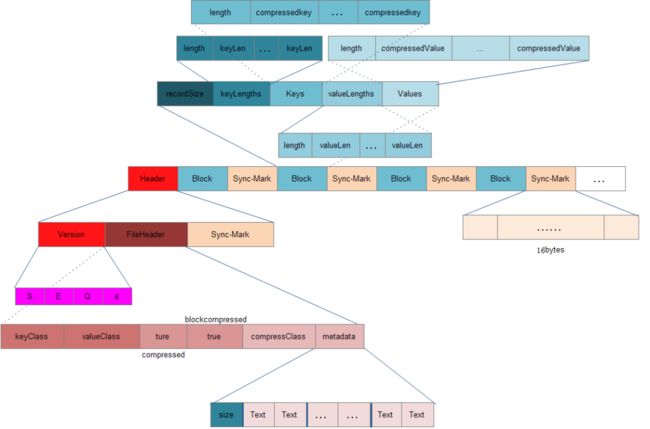SequenceFile文件
SequenceFile文件是Hadoop用来存储二进制形式的key-value对而设计的一种平面文件(Flat File)。目前,也有不少人在该文件的基础之上提出了一些HDFS中小文件存储的解决方案,他们的基本思路就是将小文件进行合并成一个大文件,同时对这些小文件的位置信息构建索引。不过,这类解决方案还涉及到Hadoop的另一种文件格式——MapFile文件。SequenceFile文件并不保证其存储的key-value数据是按照key的某个顺序存储的,同时不支持append操作。
在SequenceFile文件中,每一个key-value被看做是一条记录(Record),因此基于Record的压缩策略,SequenceFile文件可支持三种压缩类型(SequenceFile.CompressionType):
NONE: 对records不进行压缩;
RECORD: 仅压缩每一个record中的value值;
BLOCK: 将一个block中的所有records压缩在一起;
那么,基于这三种压缩类型,Hadoop提供了对应的三种类型的Writer:
SequenceFile.Writer 写入时不压缩任何的key-value对(Record);
public static class Writer implements java.io.Closeable {
...
//初始化Writer
void init(Path name, Configuration conf, FSDataOutputStream out, Class keyClass, Class valClass, boolean compress, CompressionCodec codec, Metadata metadata) throws IOException {
this.conf = conf;
this.out = out;
this.keyClass = keyClass;
this.valClass = valClass;
this.compress = compress;
this.codec = codec;
this.metadata = metadata;
//创建非压缩的对象序列化器
SerializationFactory serializationFactory = new SerializationFactory(conf);
this.keySerializer = serializationFactory.getSerializer(keyClass);
this.keySerializer.open(buffer);
this.uncompressedValSerializer = serializationFactory.getSerializer(valClass);
this.uncompressedValSerializer.open(buffer);
//创建可压缩的对象序列化器
if (this.codec != null) {
ReflectionUtils.setConf(this.codec, this.conf);
this.compressor = CodecPool.getCompressor(this.codec);
this.deflateFilter = this.codec.createOutputStream(buffer, compressor);
this.deflateOut = new DataOutputStream(new BufferedOutputStream(deflateFilter));
this.compressedValSerializer = serializationFactory.getSerializer(valClass);
this.compressedValSerializer.open(deflateOut);
}
}
//添加一条记录(key-value,对象值需要序列化)
public synchronized void append(Object key, Object val) throws IOException {
if (key.getClass() != keyClass)
throw new IOException("wrong key class: "+key.getClass().getName() +" is not "+keyClass);
if (val.getClass() != valClass)
throw new IOException("wrong value class: "+val.getClass().getName() +" is not "+valClass);
buffer.reset();
//序列化key(将key转化为二进制数组),并写入缓存buffer中
keySerializer.serialize(key);
int keyLength = buffer.getLength();
if (keyLength < 0)
throw new IOException("negative length keys not allowed: " + key);
//compress在初始化是被置为false
if (compress) {
deflateFilter.resetState();
compressedValSerializer.serialize(val);
deflateOut.flush();
deflateFilter.finish();
} else {
//序列化value值(不压缩),并将其写入缓存buffer中
uncompressedValSerializer.serialize(val);
}
//将这条记录写入文件流
checkAndWriteSync(); // sync
out.writeInt(buffer.getLength()); // total record length
out.writeInt(keyLength); // key portion length
out.write(buffer.getData(), 0, buffer.getLength()); // data
}
//添加一条记录(key-value,二进制值)
public synchronized void appendRaw(byte[] keyData, int keyOffset, int keyLength, ValueBytes val) throws IOException {
if (keyLength < 0)
throw new IOException("negative length keys not allowed: " + keyLength);
int valLength = val.getSize();
checkAndWriteSync();
//直接将key-value写入文件流
out.writeInt(keyLength+valLength); // total record length
out.writeInt(keyLength); // key portion length
out.write(keyData, keyOffset, keyLength); // key
val.writeUncompressedBytes(out); // value
}
...
}
SequenceFile.RecordCompressWriter写入时只压缩key-value对(Record)中的value;
static class RecordCompressWriter extends Writer {
...
public synchronized void append(Object key, Object val) throws IOException {
if (key.getClass() != keyClass)
throw new IOException("wrong key class: "+key.getClass().getName() +" is not "+keyClass);
if (val.getClass() != valClass)
throw new IOException("wrong value class: "+val.getClass().getName() +" is not "+valClass);
buffer.reset();
//序列化key(将key转化为二进制数组),并写入缓存buffer中
keySerializer.serialize(key);
int keyLength = buffer.getLength();
if (keyLength < 0)
throw new IOException("negative length keys not allowed: " + key);
//序列化value值(不压缩),并将其写入缓存buffer中
deflateFilter.resetState();
compressedValSerializer.serialize(val);
deflateOut.flush();
deflateFilter.finish();
//将这条记录写入文件流
checkAndWriteSync(); // sync
out.writeInt(buffer.getLength()); // total record length
out.writeInt(keyLength); // key portion length
out.write(buffer.getData(), 0, buffer.getLength()); // data
}
/** 添加一条记录(key-value,二进制值,value已压缩) */
public synchronized void appendRaw(byte[] keyData, int keyOffset,
int keyLength, ValueBytes val) throws IOException {
if (keyLength < 0)
throw new IOException("negative length keys not allowed: " + keyLength);
int valLength = val.getSize();
checkAndWriteSync(); // sync
out.writeInt(keyLength+valLength); // total record length
out.writeInt(keyLength); // key portion length
out.write(keyData, keyOffset, keyLength); // 'key' data
val.writeCompressedBytes(out); // 'value' data
}
} // RecordCompressionWriter
...
}
SequenceFile.BlockCompressWriter 写入时将一批key-value对(Record)压缩成一个Block;
static class BlockCompressWriter extends Writer {
...
void init(int compressionBlockSize) throws IOException {
this.compressionBlockSize = compressionBlockSize;
keySerializer.close();
keySerializer.open(keyBuffer);
uncompressedValSerializer.close();
uncompressedValSerializer.open(valBuffer);
}
/** Workhorse to check and write out compressed data/lengths */
private synchronized void writeBuffer(DataOutputBuffer uncompressedDataBuffer) throws IOException {
deflateFilter.resetState();
buffer.reset();
deflateOut.write(uncompressedDataBuffer.getData(), 0, uncompressedDataBuffer.getLength());
deflateOut.flush();
deflateFilter.finish();
WritableUtils.writeVInt(out, buffer.getLength());
out.write(buffer.getData(), 0, buffer.getLength());
}
/** Compress and flush contents to dfs */
public synchronized void sync() throws IOException {
if (noBufferedRecords > 0) {
super.sync();
// No. of records
WritableUtils.writeVInt(out, noBufferedRecords);
// Write 'keys' and lengths
writeBuffer(keyLenBuffer);
writeBuffer(keyBuffer);
// Write 'values' and lengths
writeBuffer(valLenBuffer);
writeBuffer(valBuffer);
// Flush the file-stream
out.flush();
// Reset internal states
keyLenBuffer.reset();
keyBuffer.reset();
valLenBuffer.reset();
valBuffer.reset();
noBufferedRecords = 0;
}
}
//添加一条记录(key-value,对象值需要序列化)
public synchronized void append(Object key, Object val) throws IOException {
if (key.getClass() != keyClass)
throw new IOException("wrong key class: "+key+" is not "+keyClass);
if (val.getClass() != valClass)
throw new IOException("wrong value class: "+val+" is not "+valClass);
//序列化key(将key转化为二进制数组)(未压缩),并写入缓存keyBuffer中
int oldKeyLength = keyBuffer.getLength();
keySerializer.serialize(key);
int keyLength = keyBuffer.getLength() - oldKeyLength;
if (keyLength < 0)
throw new IOException("negative length keys not allowed: " + key);
WritableUtils.writeVInt(keyLenBuffer, keyLength);
//序列化value(将value转化为二进制数组)(未压缩),并写入缓存valBuffer中
int oldValLength = valBuffer.getLength();
uncompressedValSerializer.serialize(val);
int valLength = valBuffer.getLength() - oldValLength;
WritableUtils.writeVInt(valLenBuffer, valLength);
// Added another key/value pair
++noBufferedRecords;
// Compress and flush?
int currentBlockSize = keyBuffer.getLength() + valBuffer.getLength();
//block已满,可将整个block进行压缩并写入文件流
if (currentBlockSize >= compressionBlockSize) {
sync();
}
}
/**添加一条记录(key-value,二进制值,value已压缩). */
public synchronized void appendRaw(byte[] keyData, int keyOffset, int keyLength, ValueBytes val) throws IOException {
if (keyLength < 0)
throw new IOException("negative length keys not allowed");
int valLength = val.getSize();
// Save key/value data in relevant buffers
WritableUtils.writeVInt(keyLenBuffer, keyLength);
keyBuffer.write(keyData, keyOffset, keyLength);
WritableUtils.writeVInt(valLenBuffer, valLength);
val.writeUncompressedBytes(valBuffer);
// Added another key/value pair
++noBufferedRecords;
// Compress and flush?
int currentBlockSize = keyBuffer.getLength() + valBuffer.getLength();
if (currentBlockSize >= compressionBlockSize) {
sync();
}
}
} // RecordCompressionWriter
...
}
源码中,block的大小compressionBlockSize默认值为1000000,也可通过配置参数io.seqfile.compress.blocksize来指定。
根据三种压缩算法,共有三种类型的SequenceFile文件格式:
1). Uncompressed SequenceFile

2). Record-Compressed SequenceFile
3). Block-Compressed SequenceFile

